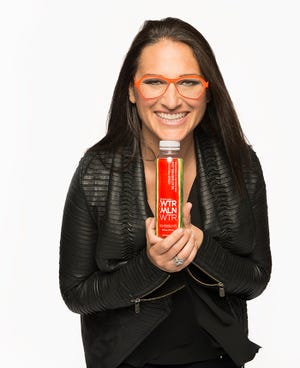WTRMLN WTR makes juice from 'ugly' fruit grocery stores won't acceptWTRMLN WTR makes juice from 'ugly' fruit grocery stores won't accept
"I believe it is manufacturers who have a very unique opportunity to do new and interesting things with food waste," co-founder Jody Levy says.

Think the only way to reduce food waste is to follow a zero-waste lifestyle? Well, it will help, but a growing number of natural manufacturers are tackling food waste through conscious sourcing.
One such company is WTRMLN WTR, an HPP juice made just with watermelon flesh, watermelon rind and organic lemon juice, that is making an extraordinary effort to prevent the 800 million pounds of misshapen and “cosmetically challenged” watermelons from ending up in the landfill.
Here, co-founder Jody Levy talks how the company sources watermelons with food waste in mind, and how watermelon juice can spread “liquid love.”
Why use misshapen, blemished watermelons in the first place?
Jody Levy: Once person’s trash is another’s treasure. We establish the price to purchase melons in bulk on a farmer-to-farmer basis, to purchase produce that would otherwise go to waste. We’re creating a positive revenue stream for farmers because they can’t sell ‘seconds’ to traditional produce buyers.
What are some other ways your company manufactures beverages with food waste reduction in mind? 
JL: It’s as much about reducing waste as it is about creating a sustainable supply chain from start to finish and beyond. It starts at the source. We hand skin the melons and extract the flesh and rind, and our leftovers are used to create animal feed for farms local to our manufacturing facilities.
All of our packaging and collateral materials are as responsible as possible. Recycled papers, BPA free recyclable plastics, etc. We are even exploring PET repurposing to help reduce our carbon footprint and plastic waste and the use of bulk-sized packaging.
We are exploring the use of biodynamic bees and ancient farming practices to get closer to the earth.
What great initiatives! How are you educating your core consumers on such conscious practices?
JL: We share our story as often as possible. Our strategy is based on designing experiences that can immerse people in our brand. With the launch of our Liquid Love Ride, a mobile school bus that travels to locations and educates people about clean, healthy living and the promise of quality and production methods that WTRMLN WTR is committed to!
The WTRMLN WTR Liquid Love Ride will be making appearances nationwide this year at athletic events, festivals and retailer locations with the promise to spread love, happiness, health, and share the brands story and mission.
Who should be held responsible for food waste? Does the onus to stem food waste fall on manufacturers, retailers or consumers?
JL: We can all do our part. From the farm to the table there are many opportunities to reduce and reuse traditional food waste!
I believe it is manufacturers who have a very unique opportunity to do new and interesting things with food waste. It helps at every level, reducing cost and connecting to a growing audience that very much wants to support mission-driven companies doing good work in our shared world.
Speaking of waste, I know that the FDA only allows plastic bottles for HPP beverages. What types of innovation, if any, are occurring in the fresh juice category to reduce plastic use?
JL: It is amazing to us that we are now able to create raw, cold-pressed drinks and clean food and have them in the food distribution system and able to stay fresh for 3 to 60 days. HPP only works with plastic. There are some other ways to get reductions of microbiological growth in a product that are coming. They include using UV light. As they scale, there may be more packaging options we all have to work with.
The best thing available now is rPET, recycled PET, which repurposes old plastic into new bottles by breaking the plastic compounds back down into a malleable substance to reform into any shape needed.
What are the next steps for WTRMLN WTR? What points in production are you actively working to solve?
JL: WTRMLN WTR is committed to continually refine and perfect our entire supply chain. This includes creating efficiencies while making more and more choices that align with our brand ethos of sustainability, environmental responsibility and quality of product.
We’re exploring every step including planting, growing and harvesting at the farms, innovation in shipping to our manufacturing space, how we handle and produce our product, all the way to our relationships with distributors and retailers and to our consumers kitchens. WTRMLN WTR’s mission is to seed change and spread liquid love.
About the Author
You May Also Like





